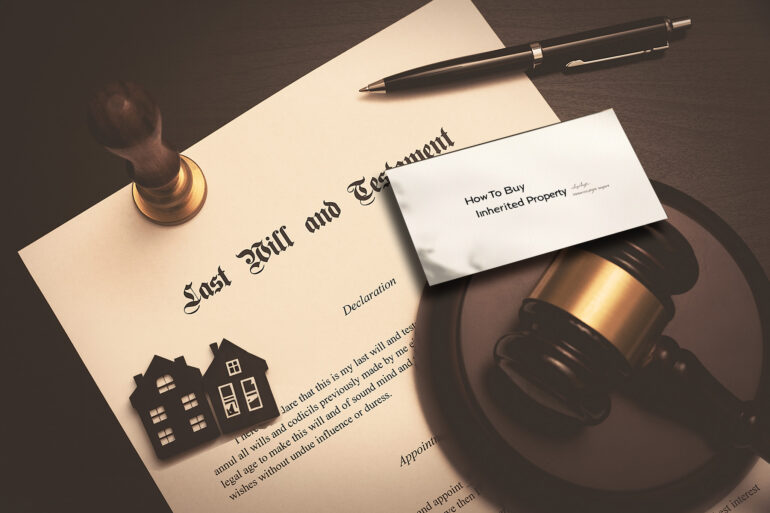How to Buy Inherited Real Estate
As Benjamin Franklin famously observed, the only certainties in life are death and taxes. When it comes to inheriting real estate, these two realities are intertwined. Heirs often want to sell these properties, and they can prove a bargain for investors. However, such properties can also come with legal issues infrequently found in other real estate transactions.
Heir Battles
Family dynamics play a role in many estate battles. An investor may think the route to purchasing an inherited home is fairly straightforward, only to learn estate litigation will tie up the transaction for a prolonged period.
Common causes of estate litigation include:
Will contests: If one heir or potential beneficiary suspects the will was forged, the decedent was under undue influence or was incompetent at the time it was signed, or another will turns up superseding the prior will, a will contest is likely to ensue.
Disinherited children: Sadly, estrangement occurs in many families. While some testators — the person creating and signing the last will and testament — may simply omit the name of an estranged adult child from their will, that is a big mistake. In most states, the will must clearly state that no provision is being made for a particular adult child. Some states allow wills to include a no-contest clause, meaning any beneficiary challenging the estate receives nothing. That is not the case in Florida.
Unknown heirs appear: Perhaps, no one is more surprised than the heirs to find out their late parent had children of whom they were unaware. While state laws differ on this issue, the appearance of such heirs significantly complicates estate settlement.
Many people put their real estate into a revocable living trust while alive. Once they die, the trust becomes irrevocable, or unable to change. While putting real estate in a trust avoids the probate process and the named trustee can distribute assets more quickly to beneficiaries, many of the same challenges can arise.
Depending on the extent of the decedent’s debts and estate assets, that may mean the house requires selling to satisfy these claims.
Intestacy
When a person dies without a will, they are intestate. That means that their estate, including any real estate titled solely in their name, is divided among their heirs based on their state’s laws of intestate succession. Those laws focus on marital and blood ties.
If the person is single and has no children or identified heirs, the state may determine what happens to the property. In Florida, such properties escheat to the state and are sold, with the proceeds going to the state’s school fund. There is a caveat. Someone who can prove that they are a relative of the decedent has 10 years from the time of escheatment to file a claim with a Florida probate court. The decedent’s estate is re-opened to allow the individual to establish their claim basis. Keep this in mind when buying properties falling under this designation.
Homestead Properties
With the exception of New Jersey and Pennsylvania, all states offer some type of homestead exemption on primary residences. These vary considerably by state, including the exemption amount and the size of the qualifying property. In Ohio, for instance, the exemption applies only to low-income senior citizens and permanently and totally disabled residents.
How homestead properties are treated for inheritance purposes also runs the gamut. For instance, in Florida, a surviving spouse and minor children always inherit the homestead property, even if the will leaves the house to someone else. Before considering the purchase of an inherited property, make sure you understand the state’s homestead property law to ensure that the heir has the right to sell the property.
Given that property prices have soared since that date, many more estates will be subject to the federal estate tax.
Creditor Claims
The executor of an estate must settle all creditor claims before assets can be distributed to beneficiaries. Depending on the extent of the decedent’s debts and estate assets, that may mean the house requires selling to satisfy these claims.
When the house has a mortgage, payments still need to be made during the estate administration process. Failing to make payments during this period can result in the home going into foreclosure. Beneficiaries may decide to sell the home to pay off the mortgage. Proceeds are divided according to the terms of the will.
Other Unsettled Claims
If the decedent died with outstanding legal claims, such as a divorce settlement or a lawsuit judgment, the executor is charged with settling these matters before assets are distributed to heirs. This may be a boon to investors, as real property may require selling to satisfy the debt. Depending on the individual situation, it could also hold up the probate process.
Heirs want to cash out and sell the properties and may prove willing to sell for less than fair market value.
Taxes
As with creditor claims, the executor is responsible for paying any estate taxes as well as filing the decedent’s final tax return. While Florida and Ohio are among the 38 states that do not impose an estate tax, that is not the case with the remaining 12.
Most estates will escape the federal estate tax, which, as of 2024, allows an exemption of $13.61 million before tax is due. However, in 2026, this amount will sunset back to an estimated $7 million unless Congress extends it. That is the exemption amount, adjusted for inflation, that existed when the 2017 Tax Cut and Jobs Act went into effect. Given that property prices have soared since that date, many more estates will be subject to the federal estate tax.
That likely means that more inherited properties will require selling to pay the tax. If the current law is permitted to sunset, investors could find executors eager to sell these properties to fund the tax burden.
Considerations
Inherited properties are often real estate bargains. Heirs want to cash out and sell the properties and may prove willing to sell for less than fair market value. That’s the plus side. On the downside, inherited properties may require a great deal of updating and renovation.
As noted, all sorts of legal complications may ensue when inherited properties are involved. Prepare to perform even more due diligence than usual. Besides checking the owner’s title documents, look into the will, which is filed at the county probate office in which the decedent resided. Check out the relationship between the seller and the decedent and whether other beneficiaries are involved.
If there are multiple heirs, protect yourself by having all of them witness the transaction. Otherwise, an heir may dispute the legitimacy of the sale. The best way to protect yourself is by hiring a seasoned estate lawyer to represent you and safeguard your rights.








